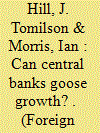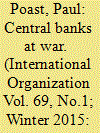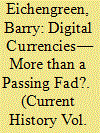|
|
|
Sort Order |
|
|
|
Items / Page
|
|
|
|
|
|
|
| Srl | Item |
| 1 |
ID:
144021


|
|
|
|
|
| Summary/Abstract |
In the years since the global financial crisis of 2008 engulfed the world and the United States fell into the Great Recession, the panic has subsided and Western economies have recovered to varying degrees. But the downturn’s effects have proved profound and lasting, and serious risks [1] persist for the global economy. The recovery has been slow, inflation levels remain below the targets set by central banks, and total debt levels are much higher [2] than before the crisis began.
|
|
|
|
|
|
|
|
|
|
|
|
|
|
|
|
| 2 |
ID:
186863


|
|
|
|
|
| Summary/Abstract |
The ability to finance conflict likely affects the odds of sustaining a war and succeeding in it. Recent literature explores rebel group funding, but far less is known about how states finance their own war efforts. This article posits that the design of central banks should affect civil war termination. In particular, it argues that central bank independence affects civil war termination through two channels. First, financial markets consider central bank independence as a good signal in terms of macroeconomic stability and debt repayment. In this way, independent central banks enhance the ability of the government to access credit to finance and end a civil war. Second, central bank independence is associated with lower inflation. Inflation control reduces one source of additional grievances that the civil war may impose on citizens. On a sample of civil wars between 1975 and 2009, central bank independence is associated with a substantial increase in the likelihood of war termination. When the form of termination is disaggregated, (higher) central bank independence is associated with a higher probability of government victory, relative to continued conflict and to other outcomes. Additional tests provide support for the argued mechanisms: during civil wars, countries with more independent central banks access international credit markets in better conditions – i.e. they pay lower interest rates, and receive longer grace and maturity periods on new debt. Furthermore, in countries experiencing civil wars, central bank independence is associated with lower inflation.
|
|
|
|
|
|
|
|
|
|
|
|
|
|
|
|
| 3 |
ID:
139789


|
|
|
|
|
| Summary/Abstract |
War is expensive—troops must be equipped and weapons must be procured. When the enormous borrowing requirements of war make the sovereigns' credibility problem more difficult, central banks enhance a government's ability to borrow. By being the sole direct purchaser of government debt, the central bank increases the effective punishment that can be imposed on the government for defaulting on the marginal lender. This increases lenders' confidence that the government will be punished in case of default, making lenders willing to purchase the debt at a lower rate of interest. The sovereign, dependent on the low borrowing costs offered by the central bank, has an incentive to retain the bank. Data covering the nineteenth and early twentieth centuries reveal that possessing a central bank lowers the sovereign's borrowing costs, particularly during times of war.
|
|
|
|
|
|
|
|
|
|
|
|
|
|
|
|
| 4 |
ID:
182517


|
|
|
|
|
| Summary/Abstract |
This commentary seeks to summarize, assess, and make integrated sense of three scholarly works that, together, help to shed light on the discussion regarding central banks’ scope, mandate, power, and independence. The issue is clearly relevant in comparative politics as one building block to evaluate both state capacities to manage the domestic economic environment routinely and the global crises faced recently. Within a period of 13 years, central banks across the world were at the center of the response to two different but highly devastating crises. The level of power enjoyed nowadays by central banks is, to a large extent, an outcome of the evolution following the 2008 crisis, which better equipped these institutions to provide some necessary economic policy interventions in 2020. The articles here reviewed are fine contributions to empirical observation and future research in this area.
|
|
|
|
|
|
|
|
|
|
|
|
|
|
|
|
| 5 |
ID:
182935


|
|
|
|
|
| Summary/Abstract |
The financial system is currently in a period of exceptionally rapid technological and organizational change, with the adoption of cloud computing to store and process financial data, artificial intelligence to analyze it, and blockchain to secure it. It is fashionable to assert that digital currencies will be part of that future. But cryptocurrencies like Bitcoin are too volatile to possess the essential attributes of money. Stablecoins have fragile currency pegs that diminish their utility in transactions. And central bank digital currencies are a solution in search of a problem.
|
|
|
|
|
|
|
|
|
|
|
|
|
|
|
|
| 6 |
ID:
185013


|
|
|
|
|
| Summary/Abstract |
A large literature establishes the benefits of central bank independence, yet very few have shown directly negative economic consequences. Furthermore, while prevailing monetary theory suggests CBI should enhance management of economic distress, I argue that independent central banks exhibit tepid responsiveness to banking instability due to a myopic focus on inflation. I show that banking crises produce larger unemployment shocks and credit and stock market contractions when the level of central bank independence is high. Further, I show that these significant economic costs are mitigated when central banks do not have the inflation-centric policy mandates predominantly considered necessary. When the bank has high operational and political independence, banks’ whose policy mandate does not rigidly prioritize inflation produce significantly better outcomes during banking crises. At the same time, I show that this configuration does not produce higher inflation, suggesting it achieves a more flexible design without incurring significant costs.
|
|
|
|
|
|
|
|
|
|
|
|
|
|
|
|
| 7 |
ID:
187259


|
|
|
|
|
| Summary/Abstract |
Efforts to accelerate the energy transition are essential. But rising demand for renewables and constrained supply of low-carbon technologies and critical resources mean green investment costs are already on the rise. The phenomenon of greenflation will introduce new geopolitical risks and exacerbate risks already associated with the energy transition. In the West, populist movements may seize on greenflation to reject net-zero emissions goals, testing national and international coalitions. However, it is the world’s poorest states that can expect to be most adversely affected by greenflation and by wealthy states’ protectionist responses. Meanwhile, states rich in critical resources will gain new geopolitical prominence as major economies court them to boost supply. Ultimately, greenflation could undermine the principal remaining strand of cooperation between China and the West – their common interest in stemming climate change. Competition, rather than cooperation, looks like greenflation’s likeliest result.
|
|
|
|
|
|
|
|
|
|
|
|
|
|
|
|
| 8 |
ID:
106123


|
|
|
|
|
| Publication |
2011.
|
| Summary/Abstract |
As terror's victims increase, hard currency commitments gain effectiveness in reducing inflation, and central bank independence loses its effectiveness, because terror reduces transparency and the number of veto players in domestic politics. PCSE (Panel-Corrected Standard Error) estimations of inflation are run on pooled cross-section time-series sample of 87 countries from 1975-2005. When the trend level rises to 100 victims annually a currency board reduces inflation by up to 7.5%, and an independent bank raises inflation by up to 8%. When victims exceptionally exceed the trend by 100, a currency board reduces inflation by 2.5%, and an independent bank raises it by 2%.
|
|
|
|
|
|
|
|
|
|
|
|
|
|
|
|
| 9 |
ID:
147423


|
|
|
|
|
| Summary/Abstract |
We study the balance sheet of the People's Bank of China and the Federal Reserve Bank in a historical context and analyze whether the recent round of global expansionary monetary policy has been effective in achieving its desired economic effects. In particular, we focus on the roles played by excess reserves, monetary aggregates and financing to the real economy and highlight the tension between a liquid financial sector and an illiquid real sector. We show that, while both China and the US have followed reserve-driven growth strategies, the compositions and relative sizes of these quantities are quite different. In relative terms, excess reserves and lackluster corporate lending constitute a big problem for the US, whereas for China the pertinent question is how to further mobilize funds tied up in the real estate and stock market. We provide some thoughts on possible solutions to the current policy dilemma at the end.
|
|
|
|
|
|
|
|
|
|
|
|
|
|
|
|
| 10 |
ID:
162850


|
|
|
| 11 |
ID:
133667


|
|
|
|
|
| Publication |
2014.
|
| Summary/Abstract |
Most economists agree that the global economy is stagnating and that governments need to stimulate growth, but lowering interest rates still further could spur a damaging cycle of booms and busts. Instead, central banks should hand consumers cash directly.
|
|
|
|
|
|
|
|
|
|
|
|
|
|
|
|
|
|
|
|
|